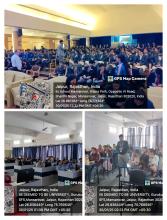Exploring Mental Health through Storytelling: A Transformative Session for IIS Students

On January 30, 2025, the Department of Psychology at IIS School organized an engaging and interactive session titled “Understanding Mental Health: The Power of Mind-Body Connection” for the students. The session, held in the school’s auditorium, aimed to provide a deeper understanding of mental health, highlighting the importance of the mind-body connection through a story-driven approach. The session was conducted in the esteemed presence of Dr.Megha Bhargava, Assistant Professor at IIS, who played a pivotal role in creating a supportive environment for the students. The session was led by Mr. Nitin Mishra, a distinguished Mental Health Ambassador from MPower, an initiative by Aditya Birla Group. Mr. Mishra began by sharing a story that illustrated how thoughts, a key component of mental health, can exacerbate physical health issues. He explained how negative or distressing thoughts could lead to various physical ailments, such as headaches, muscle tension, and fatigue, further complicating one's well-being.The story also addressed how superstitions and misconceptions surrounding mental health can intensify these challenges, creating an additional layer of stress and confusion. The narrative concluded with several insightful questions directed at the students, encouraging them to reflect on their own beliefs and attitudes toward mental health, and how these perceptions may impact both mental and physical health. The students were then engaged in a stimulating discussion about what mental health truly means. He emphasized that mental health is more than just the absence of illness; it is about maintaining emotional, psychological, and social well-being, which directly impacts how we think, feel, and act. He stressed the importance of self-care and how maintaining mental health is essential not only for well-being but also for academic and personal success.
The session also explored the concept of the mind-body connection and how mental health issues can manifest physically and vice versa, using relatable examples. He showed how stress, anxiety, and depression can lead to physical symptoms such as headaches, fatigue, and muscle tension. On the other hand, he emphasized how physical health practices such as exercise, nutrition, and adequate rest can positively influence mental health, creating a beneficial cycle. The session continued with practical tips on how students could take care of their mental health. Mindfulness practices, maintaining a balanced lifestyle, setting aside time for relaxation, and seeking support when needed were all highlighted. Acknowledging mental health struggles and seeking help through counselling is a sign of strength, not weakness was repeatedly emphasized. The session concluded with a lively Q&A round, where students shared their thoughts, personal experiences, and asked for advice on dealing with stress, balancing academic pressures, and maintaining mental well-being. Each query was answered with personalized insights, reinforcing that mental health care is an ongoing process and should always be prioritized. At the IIS School session, students walked away with a greater understanding of mental health and practical tools to manage their well-being.
The following day, a similar session was conducted at IIS (Deemed to be) University for MCA and Psychology students. As part of this session, an ice-breaking activity was introduced, designed to encourage interaction and reflection on mental health in a light-hearted, yet meaningful way. This activity allowed students to explore the theme of mental well-being through collaborative discussions and hands-on participation. This set the tone for a more engaged conversation, where students felt more comfortable sharing and asking questions.
Outcome: The session focused on mental health and the mind-body connection, providing students with valuable tools for managing their mental health both personally and academically. In both sessions, students were not only provided with clarity on mental health but were also empowered to take charge of their own well-being, creating a healthier, more open space for ongoing discussions on this important subject.

